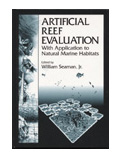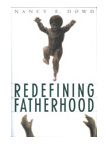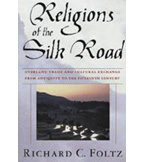 Artificial
Reef Evaluation
Artificial
Reef Evaluation
With Application to Natural Marine Habitats
Edited by William Seaman Jr.
CRC Press
Beneath the coastal waters of the world
lie thousands of artificial reefs — mostly old and retired freighters
and ships — that once plied the oceans of the world but now serve as
habitats for marine life. And as the field of aquatic habitat technology
continues to grow, more and more of these “sunken treasures” are
being deployed by dozens of developing and industrial nations around the
globe. Investors who fund reef construction projects, however, are no longer
content simply to put structures on the sea floor without documenting their
results. They want data to evaluate the performance of reefs to answer economic,
environmental and policy questions.
Artificial Reef Evaluation With Application
to Natural Marine Habitats is a comprehensive guide to the methods used
to evaluate how well artificial reefs in coastal and oceanic waters meet
their objectives. It is the first volume to combine the essential disciplines
required for evaluation, including engineering, economics, biology and statistics.
This work covers everything from the design of reef studies and multidisciplinary
methods of investigation to data analysis and examples of applying the methods
to reefs built for different purposes. Case studies of typical reef evaluation
procedures are also included. Further, the methods examined in this book
apply to other benthic marine habitats, such as coral reefs or “live
bottom,” thus expanding the book’s relevance to an even wider
audience and enhancing research efforts in the field of artificial habitat
technology.
William Seaman Jr. is a
professor of fisheries and aquatic sciences and associate director of the
Florida Sea Grant College Program at the University of Florida. He was senior
editor for Artificial Habitats for Marine and Freshwater Fisheries
and is past president of the Florida Chapter of the American Fisheries Society.
 Redefining
Fatherhood
Redefining
Fatherhood
Nancy E. Dowd
New York University Press
“A marvelous book. Timely and challenging, Redefining Fatherhood makes an important contribution to the debate currently raging about fatherhood and fathering. Redefining Fatherhood highlights many of the contradictions and ambivalences that surround present societal attitudes toward men and parenthood.” — Richard Collier, Professor of Law and Social Theory, University of Newcastle Upon Tyne, England
Most fathers parent less than most mothers.
Those fathers who do parent equally or more so than mothers are poorly supported
by our society. For children this means a loss of adult care, as well as
an ongoing and sharply defined differentiation between fathers and mothers.
Fathers are not present in children’s lives to a significant degree,
if at all, or when they are present, they are often rendered socially invisible.
For many men, their parenthood is defined as biological or economic, while
a minority of men struggle against the presumption that they are not caregivers.
In Redefining Fatherhood, Nancy
Dowd argues that this skewed social pattern is mirrored and supported by
law. Dowd makes the case for reenvisioning fatherhood away from genes and
dollars, and toward nurture. Integrating economic, social and legal aspects
of fathering, she makes the case for focusing on social, nurturing behavior
as the core meaning of fatherhood. In this nuanced and complex analysis,
she explores the barriers to redefinition, including concepts of masculinity,
the interconnections between fathers and mothers, male violence and homophobia.
Redefining Fatherhood offers a progressive
view on how men, and society at large, can change understandings and practices
of fatherhood.
Nancy E. Dowd is a professor of law, University Research
Foundation Professor and Trustee Research Scholar at the University of Florida
and author of In Defense of Single-Parent Families.
 Loving
Across The Color Line
Loving
Across The Color Line
A White Adoptive Mother Learns About Race
Sharon Rush
Rowman & Littlefield Publishers
What would a liberal, white, civil rights
law professor have to learn about race? When Sharon Rush adopted an African-American
girl, she quickly discovered the need to throw out old assumptions and start
learning over again.
This is the moving, heartfelt memoir of
a mother and daughter’s loving relationship that opened the author’s
eyes to the harsh realities of the American racial divide. Only by living
with her daughter through the day-to-day encounters and life passages did
Rush learn that racism is far more devastating to blacks than most whites
can ever imagine.
Some of the stories are funny, others
are sad, a few are almost unbelievable. But they all are poignant because
they illustrate how insightful a little three-year-old black girl can be
about race and justice. Their stories also recount the author’s struggle,
as her daughter grew older, to come to grips with her own growing awareness
of racism in America.
With love and spirituality, Rush and her
daughter live a deeply joyous life, just as they both have become increasingly
active in working publicly and privately against racism. Readers who journey
across the color line with the author and her daughter will come away with
a real-life encounter with racism and a deeper understanding of it.
Sharon Rush is a civil rights lawyer and the Irving Cypen
Professor of Law at the University of Florida. She has been studying race
for more than 15 years and currently lives with her daughter in Gainesville.
 Religions
of the Silk Road
Religions
of the Silk Road
Richard C. Foltz
St. Martin’s Griffin
“... an absolute gem ... well researched and well written, it brings
together a huge amount of information in an attractive package.”
— Jerry H. Bentley, Editor, Journal of World History
Ever since the label was coined in the
late-19th century, the idea of the Silk Road has captivated the Western
imagination with images of fabled cities and exotic peoples.
Religions of the Silk Road
looks behind the romantic notions of the colonial era and tells the story
of how cultural traditions, especially in the form of religious ideas, accompanied
merchants and their goods along the overland Asian trade routes in pre-modern
times. As early as three thousand years ago Hebraic and Iranian religious
ideas and practices traveled eastward in this way, to be followed centuries
later by the great missionary traditions of Buddhism, Christianity, Manichaeism
and Islam. But the Silk Road was more than just a conduit along which these
religions hitched rides East; it was a formative and transformative rite
of passage, and no religion emerged unchanged at the end of the journey.
Richard C. Foltz is an
assistant professor of religion at the University of Florida. He holds a
Ph.D. in History from Harvard University and has taught at Brown, Columbia
and Gettysburg College. He is the author of Mughal India and Central
Asia and Conversations with Emperor Jahangir.
 Justice
in Africa
Justice
in Africa
Rwanda’s Genocide, Its Courts, and the UN Criminal Tribunal
Paul J. Magnarella
Ashgate Publishing Co.
Justice in Africa is the recipient
of the Association of Third World Studies 2000 Book of the Year Award.
Justice in Africa describes the
United Nations International Criminal Tribunal for Rwanda (ICTR) —
the first international court created to try persons for genocide and violation
of the humanitarian law of non-international armed conflict.
The book begins with an explanation of
the causes of the 1994 genocide in Rwanda. It then discusses the UN Security
Council’s creation of the ICTR and the tribunal’s organization,
functioning, accomplishments and shortcomings. The author explains how the
tribunal has gained custody over suspects who had fled to other countries
in Africa, Europe and the United States.
Justice in Africa analyzes the
ICTR’s first several cases and describes the unique contributions the
tribunal is making to the expansion of humanitarian law.
In addition, the author describes Rwanda’s
own legal attempts to deal with the trauma of 1994 by passing a new genocide
statute and creating special genocide courts. He also explains the similarities
and differences between the tribunal for Rwanda and the one created by the
UN Security Council to deal with major crimes committed during the breakup
of the former Yugoslavia.
 University
Press of Florida
University
Press of Florida
University Press of Florida publishes scholarly books in the arts, humanities, and natural and social sciences. The Press also publishes books of interest and significance for our region and state. The Press publishes in the areas of Latin American and Caribbean studies, literary criticism and theory, philosophy, fine arts, international studies, Southern history and culture, archaeology of the Southeast, and Floridiana. For more information and to view University Press of Florida’s catalog, visit its website at http://www.upf.com